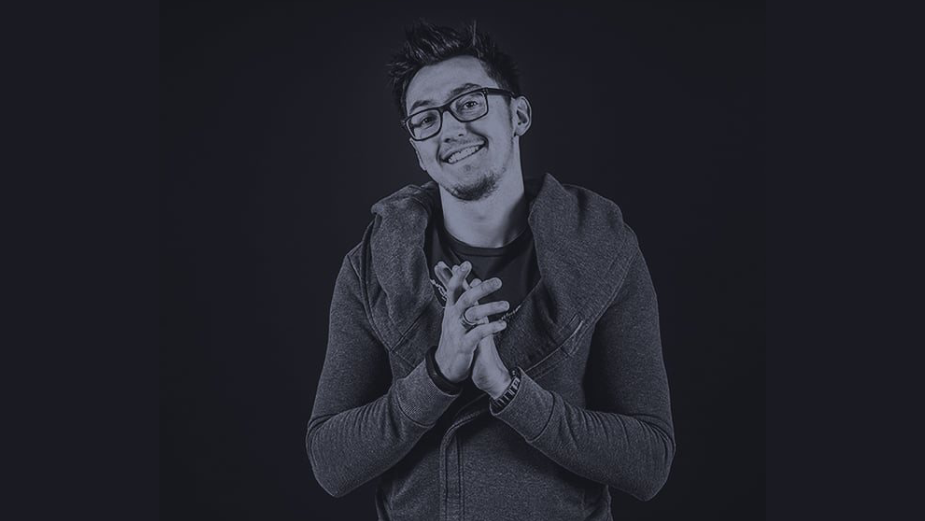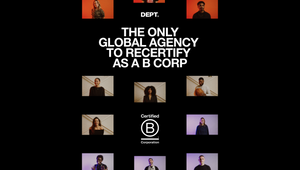
My Creative Hero: Henry Daubrez

Henry has been pretending he knows what he is doing for the past two decades and is still waiting for someone to figure that out. As the CCO and CEO at DOGSTUDIO/DEPT®, Henry enjoys biographies written about him in the third person because it makes him feel important. His past collaborations include a shameless name-dropping list, including The New York Times, Coca-Cola, Adobe, Tomorrowland, Microsoft, Marvel, and many others. Over the years, he has collected industry accolades which is the adult version of collecting rare Pokémons. Growing up, Henry spent way too much time in front of the TV, testing his parents' patience by watching 'The Neverending Story' on loop. Now, his son is doing the same. Karma’s a b****.
LBB> Who would you say is your creative hero?
Henry> I’m a complicated person, and as a complicated person, I’m going to start with a curveball. Besides my parents for offering us a chance to have a better life than they had and constantly encouraging our creative endeavors (my mother’s family emigrated from Spain to work in Belgian mines, and my dad started to provide for his family when he was 17…you know…totally different times ), I never believed in having heroes or even creative heroes. My entire life has been shaped by cultural influences, but I don’t think it can be credited to one single individual.
On the flip side, and if you want to know, I strongly believe in all the unsung heroes who inspired me along the way and motivated me to grow, learn, and evolve in a space I had no love for when I started my professional career. Looking back I can say it became a '15-years-and-counting-passion-career'. What a surprise for me.
So, YES, I’m speaking about you, pioneering digital studios. Suddenly I have plenty of names for you: North Kingdom, Soleil Noir, Firstborn, Anonymous, Legwork, Red Interactive, B-REEL, Group94, Resn, 2Advanced, etc…
Even if today, some of them still exist in some shape or form, most or at least the essence of what they used to be is now long gone. Farewell, my friends.
LBB> How long has this person been important to you and what are your first memories of meeting them or coming across their work?
Henry> I joined the 'digital space' as long as we can call it like this, during the pre-HTML5 revolution.
It also means possibilities of creativity were extremely restrained when it came to websites and that’s most of what I did learn in college. On the other hand, there was this beautiful piece of an oasis called 'Macromedia Flash', and If you have been here for long enough, you know what I’m talking about. If you don’t, 'Flash' was similar to a vector-driven After Effects with coding capabilities included and the large majority of these design studios excelled at being creative with Flash. We’re talking crazy concepts with immersive stories, stop-motion animations, 3D, and surreal 2D animations, everything was possible and nothing was too much.
On my side, I grew up in a small city in a small non-tech-savvy country, meaning inspiration wasn’t coming locally. Every day, observing each new production from these beautiful design shops was a never-ending provision of fresh inspiration and motivation (thanks to the FWA, a well-known darling veteran when it comes to awards). I remember spending a stupid amount of time dissecting the work, the frames, the storylines, and the angles to understand better and hopefully be ready to do the same one day.
Now, 15 years down the road, some of those projects are still referenced as the perfect embodiment of creativity in the digital age, for example, 'Get the Glass' by North Kingdom still comes out in most conversations with people who, like me, had their formative years during the 'Flash' era.
LBB> If it’s someone you personally know, how did you get to know them and how has your relationship evolved over the years? If you don’t know this person, how did you go about finding to learn more about them and their work?
Henry> Over the years, I got lucky enough to meet some individuals who were part of those organizations. Now, a design shop is like a living organism and we cannot praise a handful of people when it was the product of dozens of extremely passionate people.
As mentioned before, some of those shops disappeared at some point because of different reasons including but not limited to acquisitions, bad business decisions, bad luck with external factors, or just being tired of this hamster wheel of a market. For the ones that are still around, they often pivoted to something different, a lot of the talent that shaped those teams moved on, went to other shops, started their own, became contractors, or changed their lifestyle.
There’s something beautiful and fascinating about this moment in time when there was such a strong convergence of talent and individuals ready to pioneer every single day. Those digital shops made a name for themselves because they were pushing boundaries of what was creatively possible in a still immature space.
Every. Single. Day.
I mean, you have to be impressed by the amount of risk-taking, research and development, and passion that came with every one of them at that moment in time, and our sector today is so much more jaded, logically running on money, conversion, data, KPI, and whatnot, but still paraded as being the same innovation-driven space which it isn’t. You know…I’m speaking about a time when passion was the main driving force behind an entire burgeoning industry.
Oh, times have changed.
LBB> Why is the person such an inspiration to you?
Henry> Throughout your life, you’re likely to spend more time working with your colleagues than spending time with your family. It’s both depressing and a chance to transform it into something else.
Now, knowing that, wouldn’t you rather spend that time with great individuals who are as passionate as you about what you’re collectively achieving, Isn’t it exciting to be constantly pioneering and pushing boundaries?
Well, that’s exactly the inspiration I got from all of them. Exploring uncharted territory with enthusiasm and a 'can-do' attitude, never letting go of details and attention to craft, and trying to breathe this into our talented team of great people. We often say our team is a band of misfits and honestly, I strongly believe that greatness can only be born from that kind of diversity.
Finally, if you project yourself back in the early 2000s, being a digital shop wasn’t really cool and even less the norm. I remember traditional agencies sending small fractions of their global budgets and a lazy brief to copy their “above the line” marketing campaign concepts. No effort, but also often no respect for the amount of work and talent needed to create these digital counterparts. How ironic is this knowing today, digital accounts for the vast majority of these budgets?
LBB> How does this person influence you in your approach to your creative work?
Henry> I think it comes down to the core of who we are today as a team at DOGSTUDIO/DEPT®. Pushing boundaries is part of our every day as innovation is in our blood. I personally always believed in mashing-up inspirations but especially about building your own thing. We live in an “attention economy” and as our attention span is sadly growing thinner every day, our goal as a team is to retain attention by building lasting memories, how do you achieve this?
You’re creating experiences people haven’t seen yet… you innovate, you pioneer… with passion :)
LBB> What piece or pieces of this person’s work do you keep coming back to and why?
Henry> There are way too many to list them all but I think 'Get the Glass' which I mentioned before is a wonderful example.
Why? So many reasons come to my mind but the level of storytelling, craftsmanship, the approach to 3D for the characters, and working on actual physical models for the environment.
The project is soon going to be 18 years old, and although it was made with a now long-gone technology, it still has this magic spark we’re convinced users should expect from experiential projects, and at the end of the day…
Don’t we all want to feel magic in our day-to-day?















